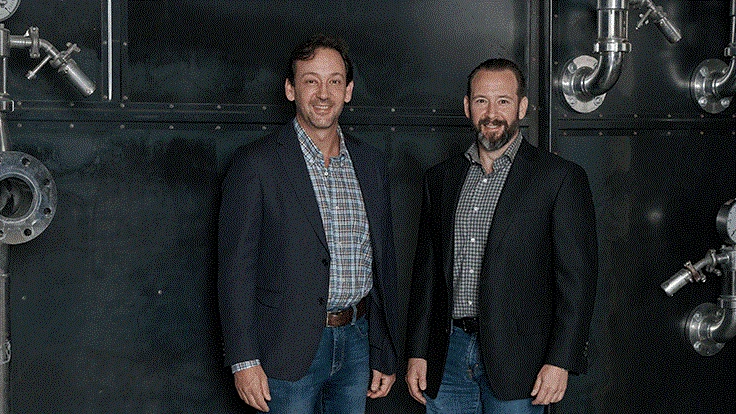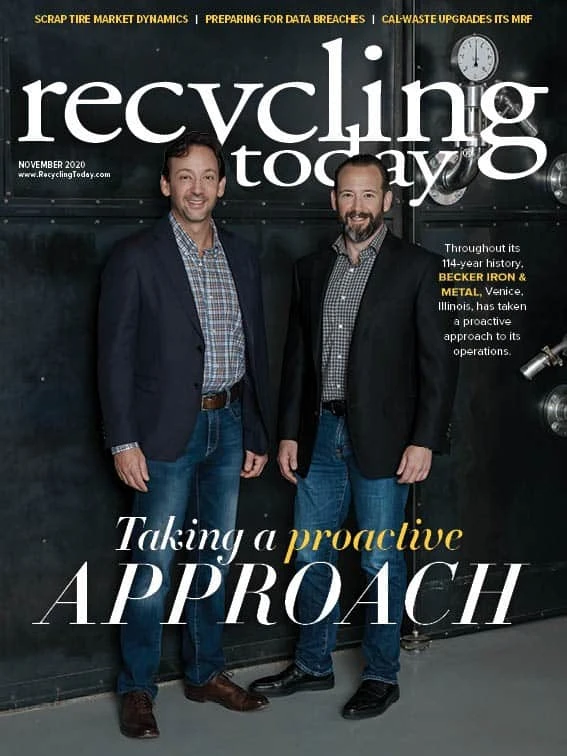

For more than 100 years, Becker Iron & Metal has been involved in scrap metal recycling in the St. Louis area. Sam Becker started the scrap business in 1906 after immigrating to the U.S. from Russia. The business initially was a way for him to make ends meet when he settled in the St. Louis area.
However, the business grew to become much more than a way to make ends meet in the decades that followed. Sam’s business expanded its reach and services throughout the 20th century, and the business has been passed down to four generations of his family.
Today, the 114-year-old business is led by brothers and Co-Presidents Mike and Dan Becker. Their father, Richard, also serves as chairman of the board at Becker Iron & Metal.
Mike says it always was his goal to work for the family scrap business, but he took one year off after graduating from college to make sure that would be the right career path for him. “I traveled overseas for 12 months. When I returned, I started work [at Becker Iron & Metal] in September 1993 and haven’t looked back since then.”
Dan says his father and brother invited him to join the family business in 2001.
“I had always kind of knew Mike was going into our family business, so I didn’t know if there would be room for me or not,” Dan says. “So, I took a different path. [After college], I went to work for a consulting firm working on large-scale change projects and mergers and acquisitions. I got a call in 2001 from my father and Mike saying, ‘Listen, we’re growing the business. If there would ever be a time you would want to come to the business, now would be a good time.’”
In the early 2000s, the brothers say their family scrap business was beginning to outgrow its 6-acre facility and office in St. Louis. They attribute that growth in part to its acquisition of St. Louis-based Fenster Metals in 1998.
Prior to that acquisition, Becker focused on retail scrap buying and had no industrial accounts. Mike says purchasing Fenster Metals gave the company about 60 new industrial accounts. After the acquisition of Fenster in 1998, Mike says, “We continued our retail trade, but we got heavily invested in industrial trade, providing equipment, containers, roll-offs and lugger buckets and trailers to service our accounts across the bistate area.”’
Today, Becker handles about 300 industrial accounts.
Mike adds that Becker also enhanced its buying program at that time, expanding the volume that it took in, which he says enabled the company to work directly with mills, foundries and smelters. Eventually, Becker hit a point where it needed more space if it wanted to keep growing.
A clean slate
In the late 2000s at the onset of the Great Recession, Mike says Becker Iron & Metal was fortunate that it had no debts and was in a good position to purchase property to expand.
The company tried to purchase property adjacent to its yard in St. Louis. However, Dan says, Becker received pushback from the city.
“[The city of St. Louis was] trying to redevelop that area, and part of the redevelopment plan was to move us out,” he says. “Our hand was forced in one way, and on the other hand, it was an opportunity. We always like to look at situations like this as an opportunity.”
Becker had to look outside of St. Louis for land. In 2009, the company purchased a 16.5-acre property in Venice, Illinois, about 3 miles away from its St. Louis yard and across the Mississippi River. The property was a greenfield site.
“We have a very collaborative organization. We want to hear from everyone among our employees, no matter what their position is.” – Dan Becker, co-president, Becker Iron & Metal
For about two years, Becker’s owners focused on planning for and constructing the new scrap yard in Venice. “We thought, ‘We can do anything in the world,’ but then we realized, ‘Where do I even start?’” Dan says. “It’s kind of intimidating once you start realizing that.”
Dan says he and Mike toured what they thought were top-notch scrap companies across the country to get ideas for the design of their new yard. The brothers made a list of best practices they wanted to include at the Venice yard. He adds that they also gathered feedback during the moving process about what their employees would want the new yard to feature.
Becker Iron & Metal hired an architect to determine the new yard’s building size, shape and placement. Mike and Dan also decided to lay rail at the new location.
Dan says moving equipment and materials from the old site to the new site while remaining in business without any service disruptions was one of the toughest parts of starting the new yard. After about a year of moving, Becker officially opened its 16.5-acre yard in July of 2011.
“It was probably one of the hardest things I’ve done professionally; but, at the end of the day, we got exactly what we wanted. It was like a custom house,” Dan says. “You put your wants and needs list together, and, at the end of the day, you’ve got almost exactly what you wanted.”
With the relocation, Dan says he also saw an opportunity to take the company’s safety culture to the next level.
He says he did something a little unconventional: He signed the company up for a free on-site consultation program offered by the Occupational Safety and Health Administration (OSHA). Through the program, a consultation group from OSHA inspected the Venice yard and informed the company of OSHA violations. The company then was given a deadline by which to address the violations.
“They thought I was nuts inviting OSHA,” Dan told Recycling Today in January about that initiative. “I had to convince [the company] that this was going to be a nonpunitive approach of getting to the next level and why not be safe right out of the gate and not have to worry about OSHA coming to us later. To me, it was the best time to bring in OSHA because then if I needed to do anything, I’m already in construction.”
Through the program, OSHA identified some minor issues that could have resulted in fines for Becker Iron & Metal. Dan adds that it was easy to rectify these issues in the time frame OSHA gave the company.
A few years after initially connecting with OSHA for the on-site consultation program, Dan says the agency commended the company for its safety culture and encouraged Becker Iron & Metal to work toward earning OSHA’s Safety and Health Achievement Recognition Program (SHARP) status. When a company achieves SHARP status, it is exempted from OSHA-programmed inspections for up to two years, with a subsequent renewal for up to three years.
In 2014, Becker received SHARP status through the Occupational Safety and Health Administration’s On-Site Consultation Program. Dan says Becker was the first scrap company in Illinois to achieve that designation. Since then, he says, the company has continued to maintain its SHARP status.
“One of the greatest things about this program is that you have a continuous- improvement-type mentality,” Dan says. “It’s not just getting the status and you’re done. It’s more about keeping awareness amongst your staff and keeping them focused on safety.”
The next chapter
About 10 years ago, Mike says he noticed that the scrap industry had matured, local competition had increased and profit margins had declined despite capital costs remaining high. To enhance business, he began working with demolition contractors to market their metals to new homes, including local steel mills and foundries, using Becker’s existing relationships.
“I traveled extensively, working with our demolition partners as they were tearing down obsolete factories, sugar mills, paper plants, textile mills,” Mike says. “It kind of opened up this door to me that, all of a sudden, I didn’t have to feel like I had to stay within a 100-mile radius of our facility.”
Providing scrap management services to demolition contractors prompted Mike and Dan to try this model with other commodities and with other types of clients.
“We realized that if we can do this with metals, there must be other commodities we can provide services for,” Mike says.

The company began to work with Fortune 500 companies, including those in several different spaces, such as retail, health care, insurance, food and beverage and commercial, to assist them with their sustainability needs.
“The need was there,” Mike adds. “We had been developing relationships for years, so the timing was right.”
The brothers named the company’s new division Becker Scrap Management Solutions (BSMS), which now serves as a single-source management service for recyclables on a full-scale multilocational basis. Mike and Dan say BSMS maximizes Becker’s network of partners across North America and helps companies cost-effectively achieve landfill-diversion goals.
BSMS provides recycling programs and product destruction services for large companies in the U.S. In one example, Mike says, BSMS helped a retail customer divert kitchen equipment from its locations across the U.S. away from landfill. BSMS paid the customer for its assets and found an end market for them.
BSMS opened an office in St. Louis in October of 2018. Currently, about 34 employees work for that division of Becker Iron & Metal. Mike adds that BSMS has provided Becker with opportunities to expand without having to resort to acquisitions or opening feeder yards.
Looking ahead, Mike and Dan say they plan to continue to focus on growing the family business by adding more industrial accounts for ferrous and nonferrous metals, as well as by expanding the company’s reach through the BSMS division.
Even with its growth, the brothers say they want to ensure the business maintains a family mentality.
Dan says their father, Richard, as well as their grandfather, Hyman, always preached the importance of being genuine with employees and interacting with them in the warehouse or scrap yard to get to know them.
“We have a very collaborative organization,” he says. “We want to hear from everyone among our employees, no matter what their position is. If someone has a good idea, we’ll run with it in order to continuously improve. So, no matter our growth, we want to maintain that family-business mentality and always take care of your employees.”

Explore the November 2020 Issue
Check out more from this issue and find your next story to read.
Latest from Recycling Today
- European project yields recycled-content ABS
- ICM to host co-located events in Shanghai
- Astera runs into NIMBY concerns in Colorado
- ReMA opposes European efforts seeking export restrictions for recyclables
- Fresh Perspective: Raj Bagaria
- Saica announces plans for second US site
- Update: Novelis produces first aluminum coil made fully from recycled end-of-life automotive scrap
- Aimplas doubles online course offerings







